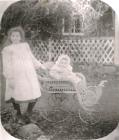2
Charles Robert Reeves Hickey (No. 116725) was born to Major R.F. and Charlotte (nee Reeves) Hickey, September 10, 1897 at French Creek, British Columbia. Charles was the oldest male in a family of eight children. Few other details remain of this young man's life.3
Charles Robert Reeves Hickey in Uniform for the RNAS1917
Formal Military Portrait, Portrait Studio

4
Charles Hickey's first posting with the RNAS was with the 4(N) Squadron in August 1917 where he was credited with four victories prior to his squadron becoming part of the newly formed Royal Air Forces as the 204. By 3 August 1918, Hickey had shot down nine enemy planes and was awarded the Distinguished Flying Cross and the Distinguished Flying Cross Bar. The DFC citation reads 'He has been engaged in numerous air battles with marked success during a period of twelve months. On a recent occasion, he flew to the assistance of one of our machined which was being pressed by two enemy machines and succeeded in destroying one of them.' The citation attached to the presentation of the DFC Bar reads 'A very determined air fighter who has destroyed seven enemy machines and brought down nine completely out of control during the past three months. His skill and initiative as a flight commandr have made his flight very successful. Last month he destroyed two machines and brought down two more out of control in one day, and the remainder of his flight, at the same time succeeded in dispersing several more enemy aircraft without sustaining any casualties.'5
On 3 October 1918, however, Hickey was killed in a crash with another allied plane piloted by Lieutenant S.E. Matthey and buried in Belgium at the Coxyde Military Cemetary, Koksijde, West-Vlaanderen. In his short career, Hickey reached the rank of Captain and posted 21 victories. He was twenty-one years old.In an interview conducted July 23, 1985 John Hickey, younger brother of Charles, remembered his brother fondly saying: 'My brother Charlie was in the air force, he was killed a month before the armistice. He called all his planes after his girlfriend in England. Her name was Billie. The planes were just one man kites.'
